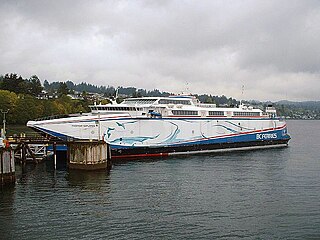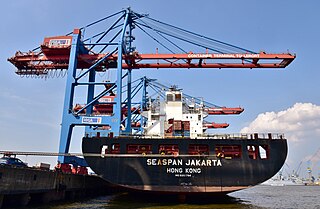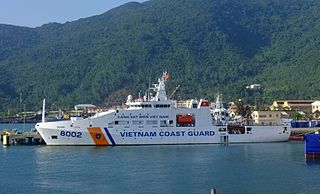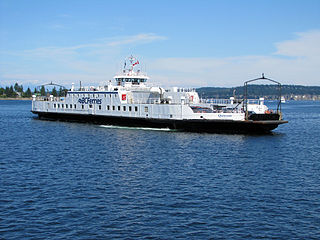
The fast ferry scandal was a political affair in the late 1990s relating to the construction of three fast ferries by the Canadian provincial crown corporation BC Ferries under direction of the Executive Council of British Columbia, headed at the time by Premier Glen Clark of the New Democratic Party.
British Columbia Ferry Services Inc., operating as BC Ferries (BCF), is a former provincial Crown corporation, now operating as an independently managed, publicly owned Canadian company. BC Ferries provides all major passenger and vehicle ferry services for coastal and island communities in the Canadian province of British Columbia. Set up in 1960 to provide a similar service to that provided by the Black Ball Line and the Canadian Pacific Railway, which were affected by job action at the time, BC Ferries has become the largest passenger ferry line in North America, operating a fleet of 41 vessels with a total passenger and crew capacity of over 27,000, serving 47 locations on the B.C. coast.

Gabriola Island is one of the Gulf Islands in the Strait of Georgia in British Columbia (BC), Canada. It is about 5 kilometres (3.1 mi) east of Nanaimo on Vancouver Island, to which it is linked by a 20-minute ferry service. It has a land area of about 57.6 square kilometres (22.2 sq mi) and a resident population of 4,500.

The Burnaby class is a ship class of ferries in the BC Ferries' fleet, built between 1964 and 1965. There are two ships in this class: MV Queen of Burnaby and MV Queen of Nanaimo. Both are propelled by controllable-pitch propellers. Both were built with two Mirrlees National KVSSM, V-16, 4 stroke-cycle, diesel engines, each producing 3,000 brake horsepower (2,200 kW) at 320 revolutions per minute.

Coastal-class ferries, also known as the "Super-C class" are three ferries owned and operated by BC Ferries of British Columbia, Canada and were built at the Flensburger Schiffbau-Gesellschaft shipyard in Flensburg, Germany. They are the second-largest ships in the BC Ferries fleet, surpassed only by the two larger, single-ended Spirit-class ferries. At the time of their building, the three ships were the largest double-ended ferries in the world, however the record has since been surpassed.

The V-class ferries, also known as the Victoria class, originally included seven ferries operated by BC Ferries built between 1962 and 1965. The V class were a continuation of the previous Sidney-class design with some cosmetic changes and different engines. These vessels were the backbone of service on the Tsawwassen – Swartz Bay route prior to the arrival of MV Spirit of British Columbia in 1993. Four of these vessels underwent vehicle capacity increases three times. The lead ship of the class, Queen of Victoria suffered significant damage in a collision in 1970.

The PacifiCat class of fast ferries was operated from June 1999 to March 2000 by BC Ferries in British Columbia, Canada. Three PacifiCat catamarans - Explorer, Discovery, and Voyager - were built between 1996 and 2000 as part of a major public project to improve ferry service between the Lower Mainland and Vancouver Island. The first two catamarans were briefly used for revenue service between Horseshoe Bay in West Vancouver and Departure Bay in Nanaimo from 1999 to March 2000. The third catamaran, PacifiCat Voyager, was completed in early 2000 but had yet to enter revenue service by the time the project was cancelled.

BC Ferries operates two T-class ferries for use on small inter-island routes. They have raised bows, which make it easier for the ships to travel in the rough seas often found on British Columbia's central coast. The ferries carry 30 cars and 150 passengers. Both were built in 1969. They were originally owned and operated by the British Columbia Ministry of Transportation until 1985, when the Ministry's saltwater ferries and routes were transferred to BC Ferries, including the T class. The two T-class ferries are Tachek and Quadra Queen II.

Seaspan ULC provides marine-related services to the Pacific Northwest. Within the Group are three (3) shipyards, an intermodal ferry and car float business, along with a tug and barge transportation company that serves both domestic and international markets. Seaspan, is part of the Washington Companies that are owned by Dennis Washington. Kyle Washington, is the Executive Chairman of Seaspan, who has become a Canadian citizen.

The Damen Group is a Dutch defence, shipbuilding, and engineering conglomerate company based in Gorinchem, Netherlands.

MV Coastal Renaissance is the first of three Coastal-class ships delivered to BC Ferries. At the time of their construction, the Coastal-class ferries were the largest double-ended ferries in the world. This ship operates mainly on the Tsawwassen – Duke Point route in the peak season and on the Swartz Bay – Tsawwassen route in the low season, but can replace her sister ships on any of the major cross-Strait routes whenever they go for refits.

MV Northern Expedition is a roll-on/roll-off (RORO) ferry operated by BC Ferries in British Columbia, Canada. She sails daily on the Inside Passage route connecting Prince Rupert and Port Hardy.

The MV Quinsam is an automobile ferry operated by BC Ferries. It was built in 1982 by Vancouver Shipyards in Vancouver, British Columbia. The ferry was originally part of the Ministry of Transportation and Highways' (MoT) saltwater ferry fleet until 1985, when the MoT's saltwater ferries—including Quinsam—were transferred to BC Ferries.

Nanaimo Harbour, also known as the Port of Nanaimo, is a natural harbour on the east coast of Vancouver Island in the Canadian province of British Columbia. The city of Nanaimo runs along the west side of the harbour. Three islands, Newcastle, Protection, and Gabriola, along with Duke Point, form the eastern edge. The Port of Nanaimo includes the Inner Harbour, Nanaimo River estuary, Departure Bay, the waters on the east side of Newcastle and Protection Islands, and Northumberland Channel. The port is under the management of the Nanaimo Port Authority.

The Salish-class vessels are four intermediate-capacity ferries operated by BC Ferries and were built in 2016 at Remontowa Shipbuilding S.A. in Gdańsk, Poland. They were the first dual-fuel powered vessels in British Columbia service, capable of using liquified natural gas or diesel oil to operate. Salish Orca entered service on the Comox–Powell River route in May 2017. Salish Eagle entered service on the Tsawwassen–Southern Gulf Islands route in June 2017. Salish Raven entered service for the Southern Gulf Islands on August 3, 2017. These vessels replaced Queen of Nanaimo and Queen of Burnaby.

Nanaimo Harbour, often associated with and referred to as the "Gabriola Island Ferry", is a ferry terminal owned and operated by BC Ferries in British Columbia that goes from downtown Nanaimo across the Northumberland Channel to Descanso Bay on Gabriola Island. The route is serviced by two ferries, the MV Island Gwawis and the MV Island Kwigwis, which can hold up to 47 cars and 450 passengers with a total travel time of about 20 to 25 minutes.

MV Island Gwawis is the sixth ferry in the Island class, owned and operated by BC Ferries. Built by Damen Shipyards in 2021, this vessel is part of the second phase of Island-class vessels. Island Gwawis was launched as Island 6 on April 22, 2021, left Galați, Romania, on October 13, 2021, and arrived at Point Hope Shipyard, Victoria, British Columbia on December 23, 2021. On January 11, 2022, Island 6 was christened and renamed Island Gwawis by BC Ferries Director of Fleet Operations and Strategy, and First People's Cultural Council Special Advisor Cathi Charles Wherry. "Gwawis" means "raven of the sea" in the Kwakwaka'wakw indigenous language.

Hullo, officially the Vancouver Island Ferry Company, is a privately owned passenger ferry service in the Canadian province of British Columbia. It operates up to fourteen daily sailings between downtown Vancouver and downtown Nanaimo on Vancouver Island. Each one-way trip takes around 75 minutes.
























